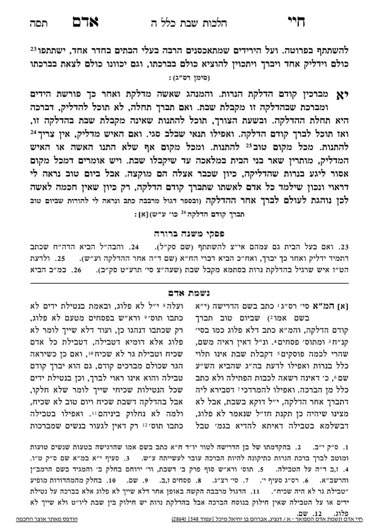We are continuing in siman 11. The Chayei Adam seems to disregard a point made by the Shulchan Aruch. If a woman is making the bracha after lighting (as is our minhag), does the kabbalas Shabbos take place when she finishes lighting, or when she makes the bracha? The practical difference between these two options is whether she is allowed to put out the match she used in order to light. Extinguishing the match is kibui, one of the 39 melachos.
The Shulchan Aruch, in 363:10, brings that out of concern for the opinion of the BeHa”G, some women have the minhag not to directly extinguish the match used for lighting, but to put it down and let it go out by itself. The Shulchan Aruch does not bring a dissenting opinion, but from the fact that he writes “some women” have the minhag to do it in this manner, he implies that others do not. If the kabbalas Shabbos is through the bracha, there is no reason why she cannot put out the match. However, if the kabbalas Shabbos occurs when she finishes lighting, she cannot put it out. Many women follow the minhag mentioned by the Shulchan Aruch.
The Chayei Adam continues, and writes that the hadlakah done in the home (whether by a woman or a man) does not impose a kabbalas Shabbos for other family members, and they can still perform melacha. The Chayei Adam also writes that even if the husband is lighting (e.g., the wife is not well), it does not affect the family members either, even if he did not make a tnai. The Chayei Adam seems to be talking about a case in which the husband accepted Shabbos through the hadlakah (if he did not, it would seem obvious that his hadlakah would not accept Shabbos for others), and even so, it does not affect other family members.
The question whether an individual’s kabbala affects members of his/her home is not brought up in the Shulchan Aruch, Taz or Magen Avraham. It is brought by the Pri Megadim, where he argues that generally, the kabbalas Shabbos of the father should affect the wife and children in the home. however,the poskim write that even if it is true, it will only apply regarding the husband/father davening maariv. Maariv is a kabbalah of kedushas Shabbos atzmah (S0121), and at that point, the family follows the husband. Even so, we learned that according to Rav Moshe Feinstein (S0119), the husband davening maariv will only affect the rest of the family if he davened maariv for the sake of the mitzvah of accepting Shabbos, and not if it is simply out of convenience. Thus, all poskim agree that if the kabbalah is through hadlakas neiros, which is a lesser level of kabbalah, it does not affect the family members.
We know that if a Jew has accepted early Shabbos, he can ask another Jew to perform melacha for him. This is known as amira l’yisroel (S0126). Although the final halacha is that a parent who has accepted Shabbos can ask a child to perform melacha who has not yet accepted Shabbos, we will clarify the dissenting opinion in the upcoming shiur, be’ezras Hashem.
Summary
Some women have the minhag to let the match used to light to die out by itself, and not to actively extinguish it.
The hadlakah made in the home does not impose kabbalas Shabbos on other family members.
A family member who has already accepted Shabbos can ask another family member who has not accepted Shabbos to perform melacha.



